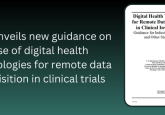Peterson Health Technology Institute launched for real-world evaluation of digital health technologies

New Peterson Health Technology Institute will independently analyze real-world clinical benefits and economic impact of healthcare innovations.
The Peter G. Peterson Foundation recently issued a press release unveiling the Peterson Health Technology Institute (PHTI) for independent real-world evaluation of digital health technology innovations to improve health and lower costs. Established by the Peterson Center on Healthcare with an initial backing of $50 million, PHTI will deliver rigorous, real-world evidence (RWE)-based assessments of the clinical benefits and economic impact of digital health solutions, as well as their effects on health equity, privacy, and security.
“It’s clear that digital tools and artificial intelligence can provide a range of benefits to patients, but we have an inadequate understanding of what works and how much it should cost,” said Michael A. Peterson, CEO of the Peter G. Peterson Foundation. “By producing independent, evidence-based research on emerging technologies, the Peterson Health Technology Institute will help improve and accelerate healthcare innovation in the United States.”
Digital health technologies are rapidly transforming healthcare and revolutionizing its delivery, with vast potential for advancing better outcomes, enhancing patient experience, promoting equity, as well as lowering costs. Patients, providers, payers, and investors have limited information about the efficacy and performance of the many digital health tools entering the sector and PHTI is being created to fill this information gap with independent, publicly available, real-world evaluations.
PTHI is partnering with the Institute for Clinical and Economic Review to establish an original assessment framework developed specifically for digital health tools. PHTI will monitor the evolving pipeline of emerging digital health technologies, then collect and analyze comprehensive, relevant real-world data (RWD) and RWE about the clinical performance of the health technologies. Through these evaluations, PHTI will identify and highlight the most promising new digital health innovations, accelerating their adoption in healthcare.
“As digital health tools replace and augment traditional healthcare, they should both deliver better health outcomes and improve affordability,” said Caroline Pearson, Executive Director of the Peterson Center on Healthcare. “In order for technology to successfully contribute to the goal of a more effective and efficient healthcare system, patients, providers, and payers need better information about what works.”
Investment in digital health in the US has increased nearly tenfold over the past decade to $15.3 billion and the global digital health market is expected to reach $1.5 trillion by 2030. Drew Altman, President and CEO of Kaiser Family Foundation and a member of the Peterson Center on Healthcare’s Advisory Board continued:
“The Peterson Health Technology Institute can play an essential role in cutting through the hype surrounding new digital health technologies and the commercial interests behind them, providing independent, evidence-based evaluations of their potential for improving care and lowering costs”
Helen Darling, former President and CEO of the National Business Group on Health and a member of the Peterson Center on Healthcare’s Advisory Board added:
“The independent evaluation of digital health tools is not only a great public service and resource, but it can also help drive the industry to be more rigorous and focused on contributions that meet the most urgent needs for information, quality care, effectiveness and efficiency.”
You may also be interested in:
- Assessing the value of digital health technologies: an interview on the experience of Germany and England
- Multistakeholder insights on digital therapeutics: balancing evidence and value to meet patient needs
- Health technology assessment of AI technologies: an interview with Rossella Di Bidino
- How digital medicine and real-world evidence are being used together to redefine healthcare: an interview with Sarah Sheehan, Digital Medicine Society
- eCOA, BYOD and digital health in clinical trials: an interview with Katie Garner, Signant Health
Want regular updates on the latest real-world evidence news straight to your inbox? Become a member on The Evidence Base® today>>>






